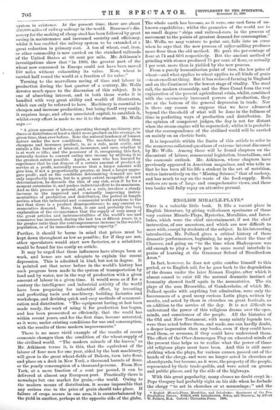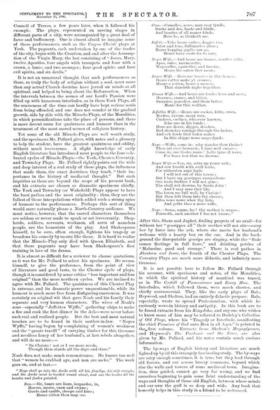ENGLISH MIRACLE-PLAYS.*
THIS is a valuable little book. It fills a vacant place in English literature, by giving well-chosen specimens of those very curious Miracle-Plays, Mysteries, Moralities, and Inter- ludes, which were the chief entertainment, if not the chief instruction, of our ancestors, and which are now difficult to meet with, except by students of the subject. In his interesting introduction, Mr. Pollard gives a critical history of these dramatic performances, beginning, he says, about the time of Chaucer, and going on "to the time when Shakespeare was old enough to play a boy's part in some moral interlude in praise of learning at the Grammar School of Stratford-on Avon."
In fact, however, he does not quite confine himself to this period, or to English soil, for he goes back to the degradation of the drama under the later Roman Empire, after which it almost ceased to exist till the natural dramatic instinct of humanity showed itself again in the monasteries. The six plays of the nun Hroswitha, of Gandersheim, of which Mr. Pollard speaks with anything but admiration, were only the forerunners of a good many curious Latin plays, written by monks, and acted by them in churches on great festivals, as an addition to the service of the day. It is not difficult to understand the power of this religious drama over the eyes, minds, and consciences of the people. All the histories of the Old and New Testament, with many saintly legends too, were thus acted before them, and made, one can hardly doubt, a deeper impression than any books, even if they could have read them, or sermons, if they could have understood them. The effect of the Ober-Ammergau Play on educated minds of the present time helps us to realise what the power of those old religious plays must have been. And this is still more striking when the plays, for various causes, passed out of the hands of the clergy, and were no longer acted in churches or churchyards, but became, as it were, the property of the people, represented by their trade-guilds, and were acted on greens and public places, and by the side of the highways.
With this great popularity, many abuses no doubt crept in : Pope Gregory had probably right on his side when he forbade the clergy " to act in churches or at mummings ; " and the
* English Mtracle.Plans, Moralities. and Interludes : Specimens of the Pre- Elizabethan Drama. Edited, with Introduction, Notes, and Glossary, by Alfred W. Pollard, M.A. Oxford: Clarendon Press. 1890.
Council of Treves, a. few years later, when it followed his example. The plays, represented on moving stages in different parts of a city, were accompanied by a great deal of farce and buffoonery. One is almost afraid to imagine some of these performances, such as the Corpus Christi plays at York. The pageants, each undertaken by one of the trades of the city, begin with the Creation, and end after the Assump- tion of the Virgin Mary, the last consisting of " Jesus, Mary, twelve Apostles, four angels with trumpets and four with a crown, a lance, and two scourges ; four good spirits and four evil spirits, and six devils."
It is not an unnatural thought that such performances as these, so truly the body of religion without a soul, must more than any actual Church doctrine have jarred on minds at all spiritual, and helped to bring about the Reformation. When the intervals between the scenes of our Lord's Passion were filled up with humorous interludes, as in these York Plays, all the coarseness of the time can hardly have kept serious souls from being offended, and one does not wonder at the gradual growth, side by side with the Miracle-Plays, of the Moralities, in which personifications take the place of persons, and there is more decent room for quaintness and humour than in the treatment of the most sacred scenes of religious history.
Yet some of the old Miracle-Plays are well worth study, and the specimens Mr. Pollard gives, with notes and a glossary to help the student, have the greatest quaintness and oddity, without much irreverence. A slight knowledge of early English literature has introduced most people to the four cele- brated cycles of Miracle-Plays,—the York, Chester, Coventry, and Towneley Plays. Mr. Pollard rightly points out the wide and deep interest of a real study of these plays, the influences that made them, the exact doctrines they teach, " their im- portance in the history of mediaeval thought." But such inquiries as these are beyond the scope of his present book, and his extracts are chosen as dramatic specimens chiefly.
The York and Towneley (or Wakefield) Plays appear to have the least pathos and the most originality : thus, they are the fullest of those interpolations which added such a strong spice of humour to the performances. Perhaps this sort of thing would more naturally please a North-Country audience. We must notice, however, that the sacred characters themselves are seldom or never made to speak or act irreverently. Shep- herds, soldiers, servants, workmen, all sorts of nameless people, are the humorists of the play. And Shakespeare himself, to be sure, often enough, lightens his tragedy or broadens his comedy by means like these. It is hard to realise that the Miracle-Play only died with Queen Elizabeth, and that these pageants may have been Shakespeare's first training in love of the drama.
It is almost as difficult for a reviewer to choose quotations, as it was for Mr. Pollard to select his specimens. He seems, himself, to give the preference, from the point of view of literature and good taste, to the Chester cycle of plays, though it is considered by some critics " less important and less original" than the more northern cycles. We are inclined to agree with Mr. Pollard. The quaintness of this Chester Play is extreme, and its dramatic power unquestionable, while its humour is much more free from disfiguring coarseness. It was certainly an original wit that gave Noah and his family their separate and very human characters. The wives of Noah's
sons—especially " Jeffettes Wyffe," gathering chips to make a fire and cook the first dinner in the Ark—were never before such real and realised people. But the best and most natural
touches are to be found in their mother-in-law. " Noyes Wyffe," having begun by complaining of women's weakness
and the " greate travill " of carrying timber for this tiresome and needless fancy of her husband's, at last rebels altogether, and will do no more :-
" Be Christe ! not or I see more neede, Though thou stande all the daye and stare."
Noah does not make much remonstrance. He knows too well that " wemen be crabbed aye, and non are meke." The work goes on, and at last :—
" Noye shall go into the Areke with all his familye, his wife exeepte, and the Arcke must be borded round about, and one the bordes all the beastes and fouler painted.
Sem.—Sir, heare are lions, leapardes, in, Horses, mares, oxen and swyne; Goote and caulfe, sheepe and kine; Heare sitten thou may see. Noyes Wife.—Yea, sir, Bette up youer saile,
And row fourth with evill hails, For withouten anye fayle I will not out of this towne ; But I have my gossippes everyechono One foote further I will not gone : The shall not drown, by Santo John !
And I may save ther life.
The loven me full well, by Christe !
But thou lett them into thy cheiste, Elles rowe nowe wher thy lists, And gette thee a newe wiffe.
Noye.—Seme, sonne, loe ! thy mother is wrawo : Forsooth, such another I doe not knowe."
After this, Shem and Japhet, finding prayers of no avail—for without her "gossippes all" their mother will not stir—carry her by force into the ark, where she meets her husband's welcome with a hearty box on the ear. And in the back- ground the disreputable gossips are singing, while the "flude comes fleetinge in full faste," and drinking pottles of " Malmsine, good and stronge." There is real pathos in Abraham. and Isaac, the fourth of the Chester Plays. The
Coventry Plays are much more didactic, and infinitely more tiresome.
It is not possible here to follow Mr. Pollard through his account, with specimens and notes, of the Moralities, in which the spiritual history of mankind was traced,
as in The Castell of Perseverance and Every Man. The Interludes, which followed them, were much shorter, and chiefly controversial. They, like the early plays of Bale,
Heywood, and Skelton, had an entirely didactic purpose. Bale, especially, wrote to spread Protestantism, with which he curiously wove-in history and antiquity. In this book are to
be found extracts from his King John, and any one who wishes
to know more of him may be referred to Dodsley's Collection of Old Plays, where his " Tragedy or Interlude, manifesting the chief Promises of God unto Man in all Ages," is printed in the.first volume. Extracts from Skelton's Magnyfyeence, and Heywood's The Pardoner and the Frew% are also given by Mr. Pollard, and his notes contain much curious information.
The by-ways of English history and literature are much lighted up by all this strangely fascinating study. The by-ways are miry enough sometimes, it is true, but they lead through
old forests, and out across breezy commons, beyond which rise the walls and towers of some mediaeval town. Imagina- tion, thus guided, cannot go very far wrong, and we find ourselves beginning to gain some faint understanding of the ways and thoughts of those old English, between whose minds
and our own the gulf is so deep and wide. Any book that honestly helps in this study is a friend to be welcomed.
Cam.—Camelles, asses, man may fyndo, Backe and doo, harts and hindo, And beastes of all maner kinde, Here be, as thinketh me.
Jaffett.—Take hear° cattes, dogges too, Atter and foie, fullimartes alsoe ; Hares hopping gaylie can go,
Hoare have conic for to eate.
Noyes Wiffe.—And hears are beares, woulfes sette, Apes, oules, marmosette,
Weyscelles, squirelles, and firrette, Heare the eaten ther meate.
Senses Wife.—Here are beastes in this 'lows°, Heare cattes make yt crousse, Heare a rotten, heare a mousse, That standee] nighe togeither.
Carnes Wiffe.—And heare are fowles lesse and more, Hearnes, cranes, and bittor,
Swanncs, peacokes, and them before Meate for this weither.
Jeffattes Wiffe.—Heare are cockes, kitte, croes, Rookes, ravens, many roes,
Cuckoos, curlues, who ever knowes, Iche one in his kinde ; Here are doves, digges, drackes, Red-shonekes roninge through tho lackes, And ech fowle that leden makes In this shippe nowo mayo fynde.
Noye.—Wiffe, come in : why standes thou theire ? Thou art ever froward°, I dare well sweare ; Come in, one Godes name ! hallo Lyme it were, For fearc lest that wo drowns.



















































 Previous page
Previous page